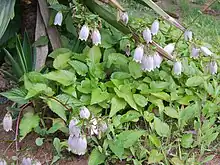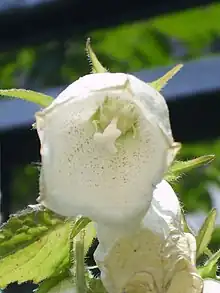Campanula punctata
Campanula punctata, the spotted bellflower, is a species of flowering plant in the bellflower family Campanulaceae. This ornamental herbaceous perennial is native to Japan, Korea, China and Siberia, and is widely cultivated for its attractive bell-shaped flowers.
| Campanula punctata | |
|---|---|
 | |
| Scientific classification | |
| Kingdom: | Plantae |
| Clade: | Tracheophytes |
| Clade: | Angiosperms |
| Clade: | Eudicots |
| Clade: | Asterids |
| Order: | Asterales |
| Family: | Campanulaceae |
| Genus: | Campanula |
| Species: | C. punctata |
| Binomial name | |
| Campanula punctata Lam. 1785 | |
The Latin specific epithet punctata means "spotted".[1]
Description
It usually grows to 30–100 cm (0.98–3.28 ft) tall and broad. It has upright stems which grow with stolons. The basal leaves are long, ovate and heart-shaped. The leaves on flowering stems are rosettes, short and ovate. They are alternate and toothed. The whole plant is covered in hairs, including flowers, stems, and leaves.[2]
Distribution
Campanula punctata is found in sunny East Asian forest edges, thickets and meadows below 2300 m. In China it occurs in E Gansu, Hebei, Heilongjiang, W Henan, W Hubei, Jilin, Liaoning, Nei Mongol, Shaanxi, Shanxi, NE Sichuan. It is also widely distributed in Japan, Korea, and the far East of Russia (Siberia).[4]
Cultivation
It is valued for its highly ornamental blooms, and is widely cultivated in temperate regions of the Northern Hemisphere. Several forms and cultivars have been developed, including:[5]
- 'Pantaloons'
- 'Pink Chimes'
- 'Wedding Bells'
- Campanula punctata f. rubriflora
- Campanula punctata f. rubriflora 'Wine 'n' Rubies'
- Campanula punctata var. takesimana (Korean bellflower)
Campanula punctata thrives in moist, alkaline or neutral soil with full sunlight. It is reported to be extremely hardy, tolerating temperatures of −20 °C (−4 °F) and below.[6]
References
- Harrison, Lorraine (2012). RHS Latin for Gardeners. United Kingdom: Mitchell Beazley. ISBN 184533731X.
- Missouri Botanical Garden
- Plant For A Future
- "Campanula punctata". Flora of China – via eFloras.org, Missouri Botanical Garden, St. Louis, MO & Harvard University Herbaria, Cambridge, MA.
- "List of Campanula punctata cultivars". RHS. Retrieved 1 June 2023.
- "Campanula punctata". RHS. Retrieved 1 June 2023.
